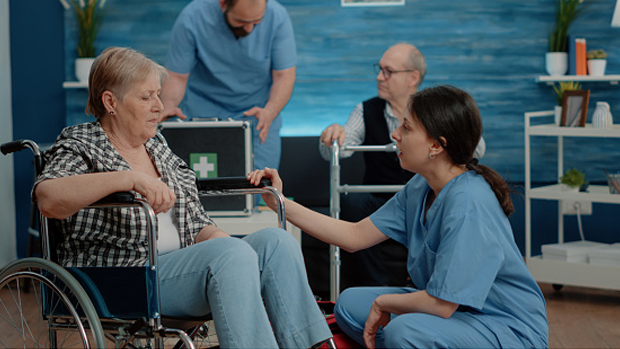

5 Innovative Nurse-Led Models of Care to Explore

Nurses play a pivotal role in developing innovative care models across the spectrum of services hospitals and health systems provide.
The American Academy of Nursing (Academy) recently selected five innovative care models to be named as Edge Runners. Edge Runners are nurse-designed, nurse-led models of care that reduce cost, improve health care quality, advance community health and enhance consumer satisfaction.
The Edge Runners program recognizes innovative ideas that transform health. Each program highlights nurses’ resourcefulness, leadership, determination and collaboration in developing new models of providing exceptional care.
This year’s models represent a range of nursing specialties, from post-care triage to sexual assault telehealth services to dementia support services, as well as the future of the profession through online residency programs and mobile simulation labs, notes Academy President Linda D. Scott, Ph.D., R.N.
All Academy Edge Runner profiles are available to view on the Academy’s website.
5 Innovative Nurse-Led Models of Care
1 | HIRAID® Emergency Nursing Framework
Kate Curtis, Ph.D., R.N., professor, University of Sydney
The HIRAID® (History, Infection risk, Red flags, Assessment, Interventions, Diagnostics and reassessment/communication) Emergency Nursing Framework is an evidence-based tool designed to support emergency nurses in providing consistent, high-quality care post-triage. Developed to address increasing global emergency department (ED) demand and lack of standardized post-triage care, HIRAID improves patient safety, documentation, communication and clinical outcomes. It is the only validated emergency nursing framework, helping nurses manage complex, high-pressure environments with structured, continuous assessment and care. One review of 2,211 patients admitted to the ED utilizing HIRAID resulted in a significant reduction in patient deterioration events and improvement in patient experience. HIRAID has been implemented into 132 EDs across Australia.
2 | Integrated Memory Care
Carolyn K. Clevenger, DNP, R.N., GNP-BC, professor and founder and director of the Integrated Memory Care (IMC) practice, Emory University
The IMC model is a nurse-led, financially sustainable, outpatient dementia care program that provides comprehensive, primary care-based services to individuals with dementia and their caregivers. It integrates medical, social and caregiver support through an interprofessional team, reducing fragmented care. IMC has served more than 3,000 patients and demonstrates reduced hospitalizations and improved caregiver outcomes. With Medicare-recognized payment models and national replication underway, IMC offers scalable, cost-effective dementia care. Early results show a drop in hospital admissions from 6.7% to less than 2%, saving an estimated $1.1 million annually for a 550-patient panel.
3 | Iowa Online Nurse Residency Program
Nicole Weathers, DNP, R.N., NPD-BC, program director, University of Iowa College of Nursing
The Iowa Online Nurse Residency Program (IONRP) is the first fully online transition-to-practice program designed to support new graduate nurses (NGNs), especially in rural and underserved areas. It offers a standardized, evidence-based curriculum adaptable to diverse health care settings. Using a hub-and-spoke model, NGNs receive online education, peer support and practical application guided by organizational leaders and preceptors. Since 2014, IONRP has expanded to 54 organizations across 13 states, improving retention, reducing costs and empowering nurses. Nearly all participating organizations have experienced positive outcomes, including first-year retention rate increases of close to 20% and noticeably improved clinical outcomes after NGN-led residency projects.
4 | Sexual Assault Forensic Examination Telehealth (SAFE-T) System
Sheridan Miyamoto, Ph.D., R.N., SANE-P, FAAN, associate professor, Pennsylvania State University Ross and Carol Nese College of Nursing; founder and director, SAFE-T
The Sexual Assault Forensic Examination Telehealth (SAFE-T) System ensures trauma-informed care for sexual assault survivors, especially in rural areas lacking access to Sexual Assault Nurse Examiners (SANEs). SAFE-T connects local providers with expert SANEs via secure telehealth and custom forensic tools, improving evidence collection, survivor support and legal outcomes. Rooted in sustainability and community partnership, the program prepares local nurses and boosts SANE workforce retention. With a 75% retention rate, 94% patient satisfaction and significant cost savings, the SAFE-T model significantly improved physical health, mental health and outcomes compared with care from untrained providers.
5 | Simulation in Motion-Iowa (SIM-IA)
Cormac T. O’Sullivan, Ph.D., MSN, clinical professor and program director, University of Iowa College of Nursing
Simulation in Motion-Iowa (SIM-IA) is a nurse-led mobile simulation-based continuing education program providing hands-on emergency training to rural and critical access health care providers, including emergency medical services, nurses and community members. Using three mobile units, SIM-IA delivers standardized, evidence-based simulations tailored to local needs across Iowa’s 99 counties. In the first three years, SIM-IA has offered more than 2,500 hours of free education to 11,000 personnel through 650 simulations, improving emergency care readiness throughout the state.



